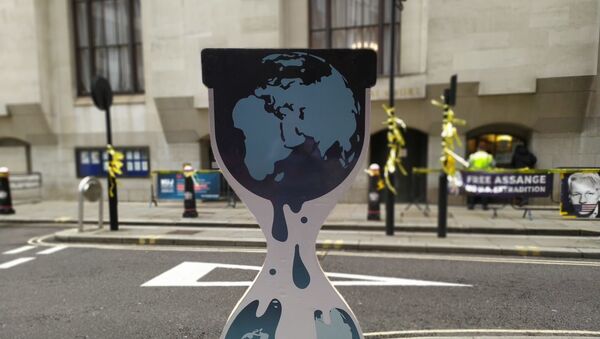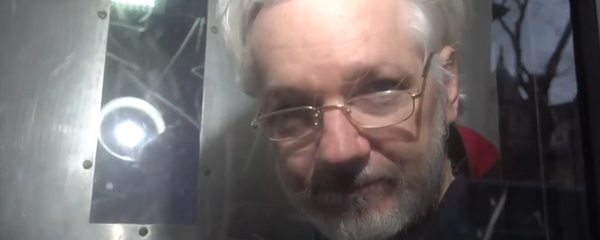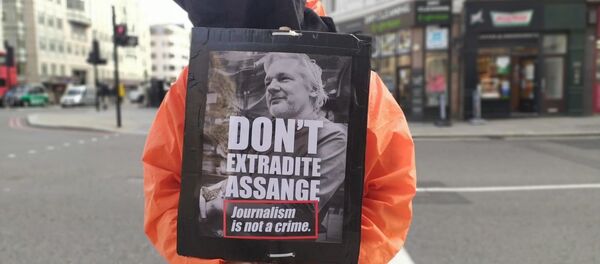Julian Assange should not be extradited to the United States to face charges of espionage and conspiracy to commit computer intrusion, District Judge Vanessa Baraitser said on the morning of 4 January 2021.
"I am satisfied that Mr Assange has the intellect and determination to circumvent suicide prevention measures [in the US]", the judge said, after rejecting every other argument posed by the defence in this case.
Assange is at Too High a Risk of Suicide, Judge Says
The decision was made purely on the basis that the WikiLeaks publisher was at too high a risk of suicide or self-harm if he is extradited.
The judge accepted that Assange would likely be subjected to high levels of isolation as well as Special Administrative Measures both before and after trial in the US that would severely impact his mental health. The judge accepted testimony that Assange was on the autism spectrum, albeit on the high-functioning end, and that both his own mental condition combined with his likely treatment in the US would pose an unacceptable risk to his mental health.
@JohnWRees of @DEAcampaign gave me his quick thoughts outside the Old Bailey. He called it an "incredible judgement". pic.twitter.com/QVbhjH5KAA
— Mohamed Elmaazi (@MElmaazi) January 4, 2021
During the extradition hearings in 2020, the court heard experts and other witnesses testify that Assange would likely face solitary confinement in both pre-trial detention and, should he be convicted, post-trial detention. Both defence and prosecution experts noted that Assange would be at a higher risk of suicide should he be extradited, although the prosecution expert believed that the risk was manageable.
— Mohamed Elmaazi (@MElmaazi) January 4, 2021
It is noteworthy that the judge rejected every other argument posed by the defence against extradition.
The decision, in one of the most politically significant and complex extradition cases of the era, marks the most important development in the two-year long extradition hearing proceedings brought against the award-winning publisher. However, it is not necessarily the end of the case.
— Judgments (@WestminsterDJMC) January 4, 2021
The court adjourned temporarily for the defence to decide whether they would launch an immediate bail application or whether they wanted to wait to prepare more fully. Barrister Clair Dobbin, speaking for the prosecution, asked the judge to continue bail. However, it is unclear as of yet whether the US government will seek to appeal the decision. The prosecution must request permission to appeal to the High Court within seven days of the date of Judge Baraitser's decision.
Judge Baraitser's decision was handed down in Court Room 3 of the Old Bailey, the same room were the Guildford Four were wrongly convicted of multiple pub bombings in 1975 leading to 15 years imprisonment before their convictions were ultimately quashed.
The US indictment against Assange almost entirely relates to his role in 2010-2011 in receiving, possessing, and publishing Iraq and Afghanistan war logs, Guantanamo Bay detainee files, and US diplomatic cables. The documents revealed war crimes as well as other criminality and abuse committed by the US government and American-backed forces around the world.

Defence Argued that Assange Could Not Get a Fair Trial in the US
WikiLeaks worked extensively with establishment news outlets around the world, including The Guardian, The New York Times, and Der Spiegel. The court heard from multiple witnesses who were present with Assange during the time period in question and who testified that both he and WikiLeaks had showed the strongest commitment to protecting potentially vulnerable CIA and US military assets by engaging in a meticulous redaction process. Throughout the case, the prosecution alleged that Assange had a cavalier attitude to the safety of informants when it came to publishing information.
If he were to be extradited, Assange would likely face a jury made up of officials who work for the CIA, the Department of Defence, Homeland Security, or the FBI, or their family members, according to expert testimony heard in September 2020. Although the judge rejected that argument, saying that the jury pool was too large and that she had confidence in the US legal system to ensure Assange would receive an impartial jury.
Trump could still potentially bring an end to the proceedings against Assange, either by directing the Department of Justice to drop the prosecution case, or alternatively to grant him a pre-emptive pardon for any alleged offences committed in the indictment against him.






